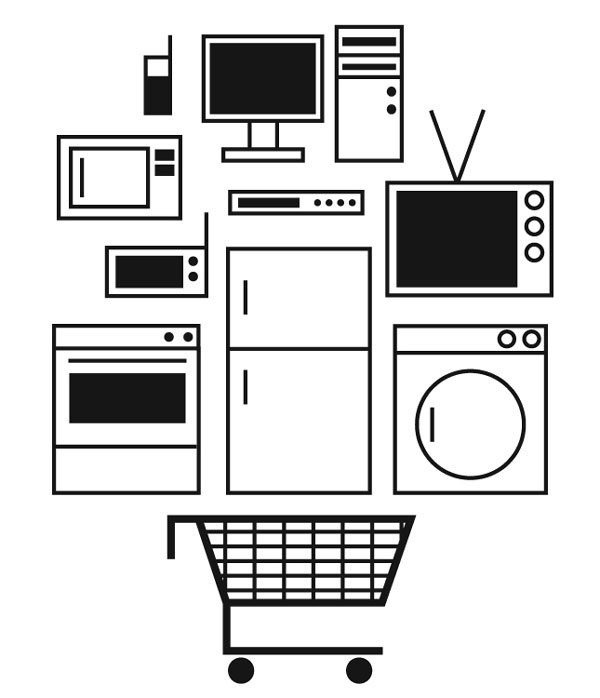|
Vocapedia > Media > USA > NYT > Illustrations >
2008-2009

Cara Lichtenstein
Being Poor in a
‘Charge It’ Society
February 17, 2008
The New York Times
To the Editor:
“You Are What You Spend,” by W. Michael Cox and Richard Alm (Op-Ed, Feb. 10),
argues that growing income disparities in this country don’t mean very much.
Consumption offers a better “measurement of financial well-being,” the writers
say, and it “indicates that the gap between rich and poor is far less than most
assume.”
Equating consumer spending with well-being, however, ignores elements of
long-term well-being like investing for retirement, saving for college
education, or building wealth through home ownership.
Over the long term, you cannot spend more than you earn, unless the assets you
own have appreciated. The rich have more assets, and they have appreciated in
recent decades. The poor do not; they have more debt, and have been harder hit
by the subprime crisis.
It’s still not easy living on a low income in this country, and the disparities
between rich and poor are significant and increasing.
Michael Kiparsky
Eric Hallstein
Berkeley, Calif., Feb. 10, 2008
•
To the Editor:
What a disappointment it was to read two members of our economic elite telling
us: Don’t worry. Be happy. The poor are like us, just with less money.
Prosperity is not a color television, a cellphone and a VCR, and for many of us
prosperity is not its own end but a means toward well-being.
Well-being is the certainty that you can provide your children with a quality
education, which W. Michael Cox and Richard Alm’s chart shows many can’t
purchase. Well-being is the security of having a good roof over your head in a
safe, clean neighborhood. And it is knowing that if your children become ill,
you have the income to help them pull through.
I am so tired of our economists (and often, our newspapers) saying that the good
life and the good society are defined by consumption (or its flip side, G.D.P.)
and that the path to happiness is simply more of it.
Keith M. Wilson
Charleston, Ill., Feb. 10, 2008
•
To the Editor:
W. Michael Cox and Richard Alm seems to equate having a lot of stuff —
refrigerators, stoves, cellphones, cars, color TVs, DVD players and the like —
with a “lifting” of the standard of living.
I disagree. The advantages of an increase in household consumption are far
outweighed by the disadvantages. Does owning a car really shorten our workday,
giving us more time to read, exercise or sleep?
As for globalization as currently practiced, it has undermined the financial
autonomy and social cohesiveness of communities both here and abroad.
And you call this the good life?
Karin J. Lauria
Marlborough, Mass., Feb. 10, 2008
•
To the Editor:
W. Michael Cox and Richard Alm say Americans in the lowest fifth for income are
able to spend almost double their income because they have other sources of
money — like bank accounts and proceeds from home sales. The major reason that
poor Americans are able to outspend their income is that they borrow heavily.
Credit-card, loan and other debt is enormous among those who cannot afford to
buy everything our consumerist society convinces them they need (or even what
they really need).
This debt burden clearly calls into question the writers’ assertion that
“consumption is a better measure of financial health than income.”
Rosalyn Benjamin Darling
Indiana, Pa., Feb. 10, 2008
The writer is a professor of sociology at Indiana University of Pennsylvania.
•
To the Editor:
I agree that United States income inequality is not as problematic as many claim
it to be. However, homes form the core of Americans’ assets. Higher-income
individuals are more likely to be homeowners. Those making less either rent and
give money away every month, or pay high mortgages resulting from modest down
payments.
Overall purchasing power matters, but it is also important to analyze the
relative burden of a major regular expenditure on a household’s budget. Then it
becomes clear that America’s free market turns out to be freer for those who are
fortunate to benefit from higher incomes.
Sebastian Wisniewski
Redwood City, Calif., Feb. 11, 2008
•
To the Editor:
Decades of social science research make it clear that spending is not the whole
story. Assets and debts also matter a great deal for family well-being and
intergenerational mobility. They are the resources families draw on to send
children to college, to help with the down payment on a first home, and to make
ends meet when times are tough.
Without assets, poor families may be able to get by, but they will have real
trouble ever getting ahead. Instead of dismissing inequality, we ought to focus
on helping poor families to acquire assets and open up opportunities.
Equality isn’t a DVD player in every household; it’s an equal shot for all
American children.
Daniel Schneider
Princeton, N.J., Feb. 11, 2008
Being Poor in a ‘Charge It’ Society,
NYT, 17.2.2008,
http://www.nytimes.com/2008/02/17/opinion/l17spend.html
|